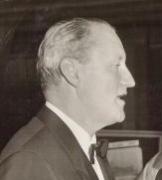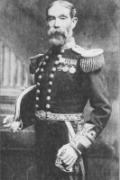|
|
||||||||||||||||||||||||
 |
Featured person
Recently added |
William MacQuitty (1905 - 2004): |
||||||||||||||||||||||

|
| William MacQuitty |
William MacQuitty was born on 15 May 1905, the son of the managing director of The Belfast Telegraph. Educated at Campbell College he joined the Chartered Bank of India, Australia and China. Having worked briefly in Belfast and London, in 1936 he took up his first posting in the Far East, at Amritsar in Punjab where he was enthralled by the exotic contrast of the Orient with his homeland. In l928 he became a founder member of the Lahore Flying Club. He worked in Ceylon, Siam, Malaya and China before returning to Ireland in 1939.
Having briefly worked at farming and beginning medical studies in London, his attention switched to filmmaking as his amateur film Simple Silage, made for the benefit of Ulster farming neighbours, came to the attention of the Ministry of Information.
MacQuitty's contributions to the war effort included Out of Chaos, a portrait of the war artists Henry Moore, Stanley Spencer, Paul Nash and Graham Sutherland, among others, and The Way We Live, which chronicled the rebuilding of the heavily bombed city of Plymouth.
Big feature films followed: Happy Family, Street Corner, The Beachcomber; Above us the Waves; The Black Tent and The Informers. His greatest achievement in films was A Night to Remember, the classic account of the sinking of the Titanic, which was doubly satisfying because in l911 as a six-year-old he had witnessed the ship being launched.
In 1959 MacQuitty helped to found Ulster Television, becoming its first managing director. The station created a link with Queen's University, Belfast, and showed Britain's first adult education programme, Midnight Oil. It set up its own art collection, with the support of painter and sculptor Angela, Countess of Antrim (Angela Sykes), whose husband, the Earl of Antrim, was the chairman of the group who set up Ulster Television in 1959.
In Egypt, initially to research and make a film about Gordon of Khartoum he became fascinated instead by the attempts to save the temples of Abu Simbel from the flooding that would follow the completion of the Aswan High Dam. MacQuitty presented the unsuccessful British plan to save the temples by building a small dam around them, not to keep water out but to keep crystal-clear, filtered water in. Visitors would then have looked at the engulfed temples from observation galleries at various depths.
That experience led to his first book, Abu Simbel. He went on to produce almost a book a year on a variety of subjects, reflecting his interests in the Orient, all illustrated with his award-winning photographs from a library of a quarter of a million taken by him over 60 years in 75 different countries.
MacQuitty published two books on gardening, Irish Gardens and Great Botanical Gardens of the World. His most successful book, Tutankhamun: The Last Journey, sold half a million copies. His photograph of Tutankhamun's funerary mask was used as the poster for the l972 British Museum exhibition of the tomb's treasures.
MacQuitty wrote an autobiography, A Life to Remember (l991). His last book, Survival Kit: How to Reach Ninety and Make the Most of It, was published in l996.
In 2002 the Royal Photographic Society awarded him with the Society's Lumière Award for distinction in film and photography.
He died on 5 February 2004.
| Born: | 15 May 1905 |
| Died: | 5 February 2004 |
| Patrick Devlin |
| References: A Life to Remember Autobiography; 1991, Quartet Books |


Home | Our Policies | Plaques | Browse | Search | Sponsors | Links | Help | Contact
Privacy & Disclaimer | Cookie Policy | Site Map | Website Design By K-Point
© 2024 Ulster History Circle









